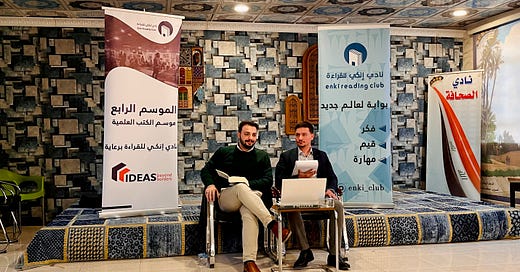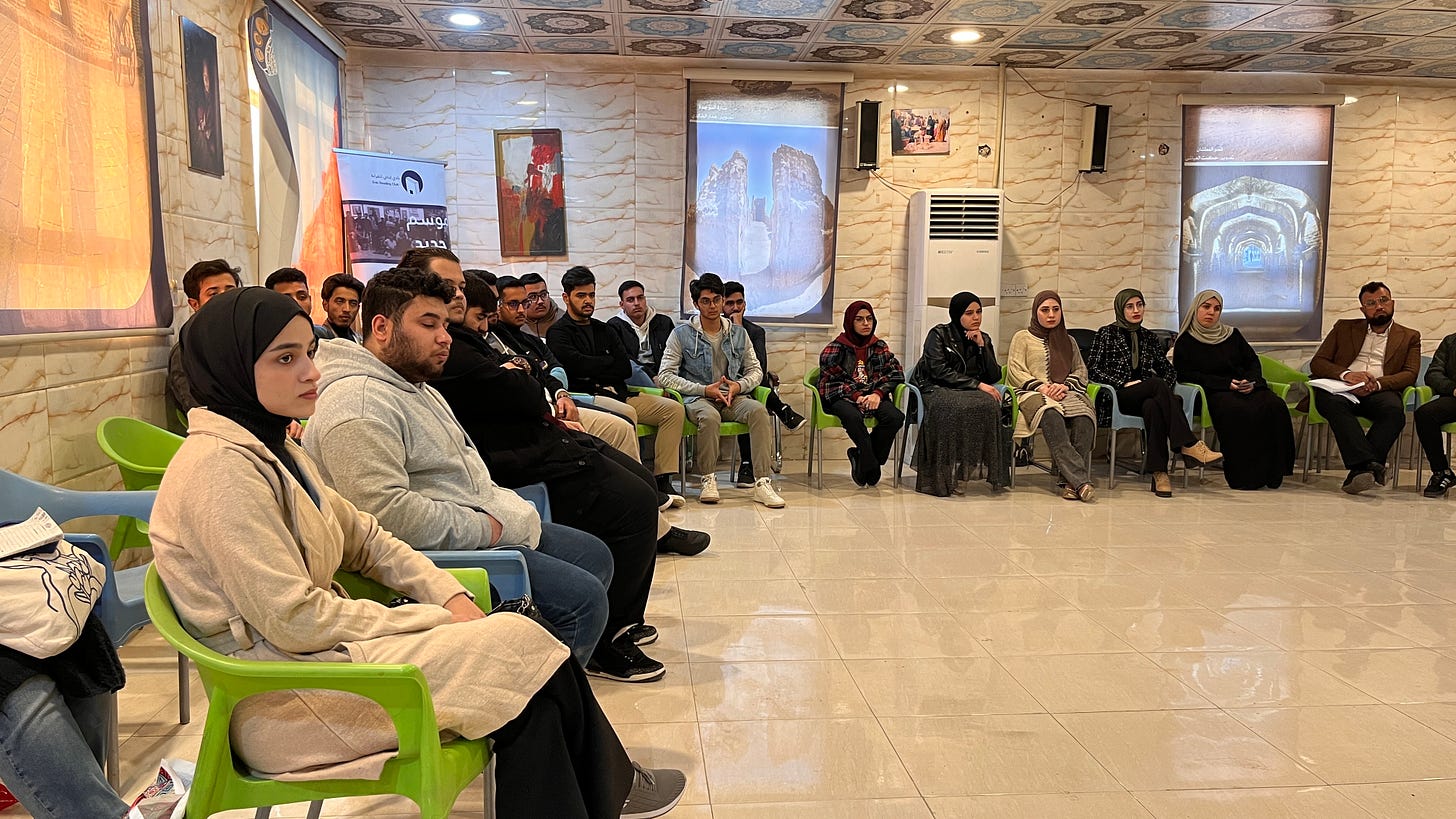Free speech in one of Iraq’s most conservative cities
A book club in Karbala is carving out space for free speech among those who have been warned to stay silent.
Mohammed Gelewkhan was 14 when he was warned against asking questions in class. A voracious reader, he was curious to know more about Iraqi society and its relationship with religion. He was accused of atheism, a serious allegation in Iraq, and told to stay silent. “It taught me not to speak openly in society, you really have to be careful where you speak,” says Gelewkhan.
These days, he reserves probing questions for Enki, a book club that provides rare opportunities for discussion and debate in his home city, Karbala, a holy place for Shia Muslims in Iraq. “It’s lovely to have a place like Enki to talk openly—anywhere else things would go wrong,” says Gelewkhan, now just 16 years old.
Last Friday, he attended the club’s session on Rationality by Canadian cognitive psychologist Steven Pinker, whose works have been translated into Arabic by Ideas Beyond Borders. Over 40 people showed up to discuss the book, which affirms the human capacity for clear reasoning and examines the tools we use to get there. It is a textbook in critical thinking, rejecting claims that humans are inherently irrational beings and pointing to the power of logic and reasoning over illusions like bigotry and bias.
This was fertile ground for Enki attendees, who examined the spread of pseudo-science, the rationality of religious belief, and the nature of morality, particularly in the Abrahamic faiths. The session ran over, lasting more than two hours. “People were deep in discussion, drawing connections between the themes in Pinker’s book and real life in the Middle East,” says Hameed Majeed Hameed, who founded the book club in 2022.
“Reading this book can change the way people perceive information and help them differentiate between information and misinformation,” he adds, pointing to the power of local religious leaders to steer public opinion in Karbala.
Growing up here, Hameed felt the need to carve out space for free expression, somewhere beyond the reach of strict social constraints. Life in the conservative city can feel stifling, particularly for younger generations. So, he teamed up with fellow students to launch Enki, naming it after the Sumerian god of wisdom to reinforce the power of books and education.
More than 400 people applied to attend the first session as men and women embraced the rare opportunity to discuss scientific subjects and engage in open debate. “Karbala is so conservative that even people studying physics at university hardly discuss science. All they talk about is religion,” says Hameed, who studies law at the University of Karbala.
Enki participants now gather regularly to explore a range of books covering philosophy, science, psychology, and other fields, from Charles Darwin’s Origins of the Species to works by Richard Dawkins. Many are students like Hameed, though they encourage everyone to attend, hoping to open people’s minds to new ideas and broaden their thinking in a free and friendly debate environment.
Mohammed recalls one surprising afternoon when his father arrived early to pick him up and decided to join in. “It was really fun and refreshing seeing my dad, an older - not very liberal - conservative Iraqi man, talking about his views with youth who have different ideas,” he says.
While Mohammed’s parents appreciate his passion for reading, they don’t share his appetite for philosophy and science. “They just don’t really take it seriously, they see philosophy as this weird witchery that people engage in to complicate their lives,” he says. Denied a receptive outlet at school and at home, Enki is a lifeline for his intellectual curiosity, a place to interact with like-minded people who share his desire to learn.
Last year, Enki secured an Innovation Hub grant to run more gatherings, moving from fortnightly to weekly sessions to meet mounting demand. Hameed sees these sessions as a starting point for young people pushing back against the free speech gatekeepers in Karbala, but there’s a long way to go. He cites the fate of Karbala’s contemporary art gallery, The Salah Hithani Museum, as an example of the hostility towards new cultural movements in the city. “Initially, we held our sessions there, but local leaders had it closed. They saw the gallery as a threat to the holiness of the city, so now it’s a video gaming hall,” he says.
Hameed does not exaggerate the scope of a single book club to change the status quo. Books alone cannot alter the course of history, but if enough people join the discussion, he believes perspectives will shift. Since the Tishreen protests of 2019, when tens of thousands took to Iraq’s streets, there has been a new receptiveness to ideas among many Iraqi youth.
“Things like this really move the mindset of youth in Iraq. Sadly, you can’t really change the adults; their conservatism is baked in, but youth mentality is certainly better than before,” adds Mohammed, who attends most weeks. The sessions have restored his confidence since that frightening experience at school and allowed him to believe that one day, it may be less dangerous to express opinions in public. “Judging by my relatives and classmates, the future doesn’t inspire me, but seeing how people at Enki engage with philosophy and science fills me with hope. It makes me happy, and I feel a bit more safe when I look around the room at people engaging in open discussion.”
Not everyone who attends is a literary enthusiast. Zaher Jamal, a 21-year-old civil engineering student, has little time for extra-curricular reading, but something about Enki piqued his curiosity. “It gave me that space for books. I love seeing people discuss issues with open minds. There’s a real sense of community,” he says. Attending the discussion on Rationality last week, he was struck by the frankness of the debate on topics that would be off-limits elsewhere.
“I never imagined being able to influence and be influenced by others; it’s really beneficial. Since joining Enki, I’m reading more and sharing these ideas with certain friends and members of my family,” he says.
This is the gradual influence that Hameed hopes for when he imagines the impact of Enki in the months and years ahead. On several occasions, he has overheard strangers mirroring conversations from book club sessions, proof, he hopes, that ideas are spreading. “If enough people read a book, it inspires dialogue and debate. A club like Enki can ignite those discussions and, maybe one day, that can lead to change,” he says.
This article was written by Olivia Cuthbert.





